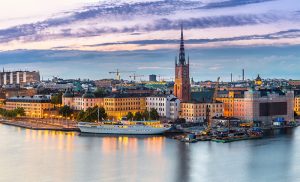Sweden – A Controversial Approach Belatedly Vindicated

Stockholm
The Swedes are a trusting lot. Asked if they usually confide in ‘other people’, almost two-thirds of Swedes answered ‘yes’. In the US and the UK, the comparable numbers hover around the 30 percent mark. According to data tabulated by the World Value Survey, just about 4 percent of Colombians trust others whilst, on the other end of the scale, 73 out of 100 Norwegians expressed no fear of relating to their fellow men or women – and trusting them.
The exceptionally elevated level of trust displayed in Sweden reflects on the government as well. Although the share of people with a ‘very large’ confidence in the national government has retreated slightly from its 2010 high of 52 percent, most Swedes are reluctant to think ill of their elected officials and bureaucrats.
As a result, Swedish society is rather compliant and placid, if not serene. The concept of civil disobedience is alien to the nation. Whomever dares break away, rebel, or otherwise act up and shred the social covenant is cast to the fringes of civil society where the maladjusted and troubled dwell in relative comfort but largely without voice or face.
As a swift and radical deviation from the highly prized and peaceful normal – the country hasn’t suffered a war in over two centuries – the Corona Pandemic profoundly upset and confused Swedish society. Moreover, its government lacked the legal instruments – readily available to its counterparts elsewhere – to tackle the novel emergency. The constitution, comprised of four (uncodified) basic laws of which the oldest was drawn up in 1634, has no provision for declaring of state of emergency outside war. As a result, the government did not possess the authority to restrict freedom of movement.
Dualism
An additional limitation was found in the administrative dualism the characterises the Swedish attitude to government. A large number of state institutions are fully autonomous and, as such, beyond the reach of ministers. They operate and act regardless the government’s wishes. Thus, the Public Health Agency (Folkhälsomyndigheten) ruled supreme during the pandemic. Its edicts, pronounced with gravitas by state epidemiologist Anders Tegnell, carried significantly more weight and meaning than the interventions of Prime Minister Stefan Löfven and even the televised appearance of King Carl XVI Gustaf.
Finally, the national government’s powers are also limited by municipalities and lands that set their own policy and manage public healthcare, social welfare, and a host of other services – and do not take kindly to interference from Stockholm. About the only option open to the national government was to restrict public gatherings to a maximum of 500 at the onset of the pandemic, a number later reduced to 50. Even so, the decision needed the approval of both the national parliament (Riskdag) and every regional chamber (Landsting).
The choice, made in early March, to pursue herd immunity was founded as much on constitutional necessity as it was on public healthcare considerations. The government has now admitted that it made a mistake. At the beginning of May, just about a quarter of the 2.4 million people living in the Greater Stockholm area had obtained some degree of immunity by exposure to covid-19. The 50 percent expected by mid-June was never attained.
Whilst the viral outbreak reached its first high in early May, and fatalities were mounting at an alarming rate, most Swedes remained steadfast in their trust of official policy even though their country came in for strong criticism internationally. The absence of a lockdown caused almost universal consternation as people confined to their homes elsewhere in Europe and the world watched in astonishment as ‘irresponsible and frivolous’ Swedes enjoyed the springtime in the great outdoors, albeit keeping their distance and avoiding crowds as per medical recommendation.
In soon transpired that in a high-trust society a hint or recommendation suffices to get the message across. Remarkably, the government took a backseat and let public health authorities set policy. Even as the death toll mounted, and the herd immunity idea was rather hastily ditched, political fallout remained close to nil. Support for Prime Minister Löfven’s Social Democratic Party actually increased noticeably.
Home Alone
At Malmö University, Senior Lecturer Astrid Hedin explained that Sweden is sparsely populated with just 25 inhabitants per square kilometre and people are used to keeping their distance from each other. Besides, she added, Swedes are not known for their touchy-feely disposition. Ms Hedin also noted that single-person households make up 57 percent of the total, the highest share in Europe.
However, communication was key to preserving the Swedes’ institutional trust: “The Public Health Agency has not presented itself as infallible. Instead, they emphasised time and again their willingness to change policy should another country find a better way of addressing the pandemic.”
Although happy with both their government and public health officials, Swedes were visibly hurt by, and disappointed in, the neighbours. Denmark, Finland, and Norway closed their borders to travellers from Sweden which pointedly did not follow suit. The avalanche of international criticism proved a painful novelty for a people more accustomed to being celebrated for their model behaviour – and neatly organised country.
However, of late the tide has been turning in Sweden’s favour as other countries realise that strict lockdowns represent but a blunt policy instrument that can only be used once before fatigue sets in. As the pandemic continues, weariness is on the rise with increasing numbers of people in the United States, the United Kingdom, Germany, and elsewhere giving voice to their discontent with restrictions on civil liberties – real or imagined.
In fact, other countries have been opening up whilst the virus was still present, emulating, in a sense, the Swedish approach which excluded stay-in-place orders from the get-go. Mr Tegnell still argues that the effectiveness of lockdowns in containing the spread of the virus is yet unclear and far from a scientific given.
Dr David Nabarro, one of six World health Organization special envoys on covid-19, heaped praise on Sweden’s light-touch approach and said that, in the long run, universal behavioural change is probably the only way to limit outbreaks. At 57.16 per 100,000, Sweden’s covid-19 death rate ranks almost at par with the US (55.95) and just below that of Brazil (57.68) and Italy (58.71). It is also not that far removed from Spain’s (62.09) and the UK’s (62.55). However, Belgium – which imposed strict lockdowns and reduced ‘social bubbles’ to a minimum – recorded a much higher mortality rate (86.62) and a case-fatality incidence almost four times as high as the one recorded in Sweden.
Sore Thumb No More
In Northern Europe, Sweden did stand out as Denmark (10.76), Finland (6.07), and Norway (4.97) all managed to contain the spread of the disease and keep fatalities in check by leveraging public trust and strictly observed lockdowns. For Johan Carlson, director-general of the Public Health Agency, the comparison fails to take into account that the infection rate keeps heading down in Sweden whilst it is creeping up elsewhere: “I call that the champagne cork effect.”
There is an economic angle to the light-touch approach as well. Dr Carlson warned that an economic malaise with a sharp rise in joblessness can also deteriorate public health and prove deadly as social services need to be curtailed and people cut back on the quality of their food whilst dealing with high levels of stress.
According to Statistics Sweden, the country’s GDP retreated by 8.6 percent during Q2 2020 which compares favourably to the rest of the European Union which saw its overall GDP shrink by 11.9% over the same period. The Swedish unemployment rate, traditionally the highest in the Nordics, rose to 9 percent, up 1.9 percentage points since March. For the entire year, GDP is forecast to drop with 5 percent – a decline similar to those expected throughout the Nordics.
What makes Sweden’s approach to covid-19 unique is that the nation recognised early on that the novel corona virus, absent a vaccine, cannot be completely eliminated and will likely become a contemporary health fixture not dissimilar – in that aspect – from the seasonal flu. The nation also agreed to put the pandemic in perspective. The Swedish Statistics Office was quick to remind people that in both 1993 and 2000, excess mortality was significantly higher than it is now due to particularly virulent flu strains.
Sweden, then, is keeping calm and carrying on. With a stiff upper lip that would probably cause even the most stoic of Brits to award the nation an approving nod.
You may have an interest in also reading…
Poland Closes the Gap and Calms Covid Jitters with a Bold Programme of Reform
The pandemic has brought an end to its 30 years of GDP growth for Poland — but this should be
Europe’s Golden Eleventh Hour
In true EU fashion, a compromise solution is taking shape for member states unable to power up their economy for
US Election – Trump and Biden Crush Policy Ideas and Initiatives in Televised Clash
In the US, the number of covid-19 deaths has rushed past 200,000 whilst worldwide more than one million people succumbed


















































































